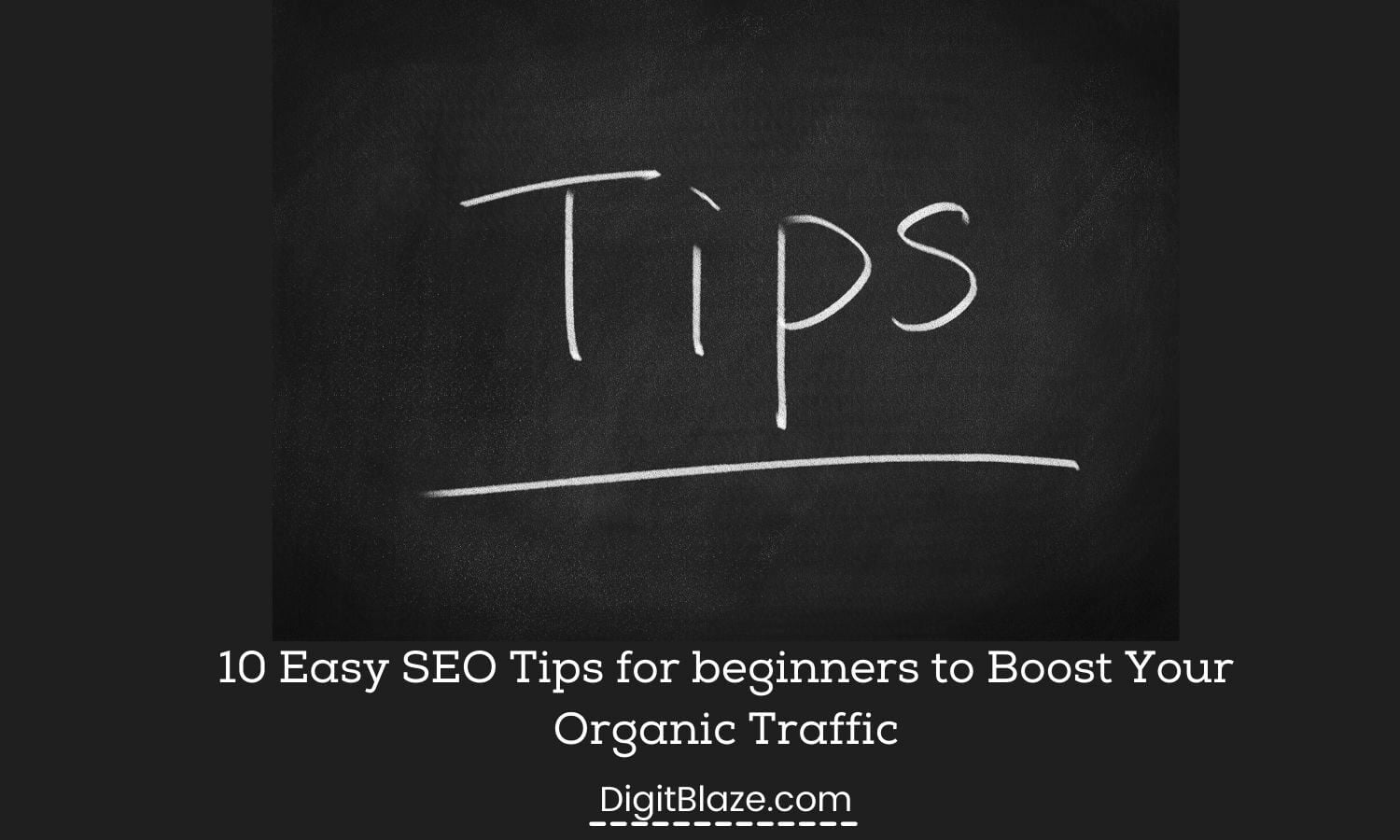Do you want to boost your organic traffic?
If so, you’re in luck!
In this blog post, I will discuss 10 easy SEO tips for beginners that will help improve your website’s rankings on search engines.
These tips are simple and easy to follow, and they can make a big difference for your business.
So what are you waiting for? Start implementing these tips today!

10 SEO Tips for beginners to Boost organic traffic
SEO is important if you want your website to rank high on search engine results pages (SERPs).
There are a number of things you can do to improve your SEO, and in this blog post, I will discuss five easy tips that will help boost your organic traffic.
Tip #01: Use keyword-rich titles
The title of your blog post should include one or two main keywords that are relevant to the topic of your post.
This will help search engines understand what your post is about and index it accordingly.
In addition, using keyword-rich titles will also help you attract more clicks from organic search results.
Remember your title is the first interaction you have with potential readers, so make sure it’s catchy and to the point!
Tip #02: Optimize your meta tags
The meta tags on your website are important for both search engines and users.
Meta tags provide information about your website, such as its title, description, and keywords.
Make sure to include relevant keywords in your meta tags so that search engines can easily index your website.
In addition, users will also be able to see what your website is about before they even visit it.
This is why it’s important to make sure that your meta tags are accurate and descriptive.
Tip #03: Use alt text for images
Whenever you add an image to your blog post, always remember to include alt text.
Alt text is a short description of the image that is used by search engines to index images.
Including relevant keywords in your alt text will help improve your website’s SEO.
Not only that, but it will also help users who are looking for specific images on search engines.
Tip #04: Create internal links
Internal linking is important for two reasons. First, it helps search engines index your website more easily.
Second, it helps users navigate your website more easily.
When creating internal links, make sure to use keyword-rich anchor texts so that both search engines and users can benefit from them.
When interlinking posts always remember to link to other related articles on your website. This will help search engines understand the context of your article and index it accordingly.
It will also help users find more information about the topic they are interested in.
Tip #05: Optimize Website Speed
The speed of your website is important for both search engines and users.
Search engines take into account the loading time of your website when ranking it on SERPs.
In addition, users are also more likely to abandon a website that takes too long to load.
There are a number of things you can do to improve your website’s speed, such as optimizing images and using a content delivery network (CDN).
Use google page insights to test your website speed and get recommendations on how to improve it.
Tip #06: SEO Friendly permalinks (URLs)
Your website’s permalink structure is important for both search engines and users.
A permalink is the URL of a blog post or article.
It should be descriptive and include relevant keywords so that search engines can index it easily.
In addition, it should be easy to read and remember so that users can type it into their browser without any problems.
You can change your permalink structure in the settings of your content management system (CMS).
Tip #07: Limit the number of plugins you
Adding too many plugins to your website can slow down your website’s loading time.
This can negatively impact your SEO as well as the user experience.
Only add plugins that are absolutely necessary and delete any that you are not using.
Tip #08: Use Google Search Console
Google Search Console is a free tool provided by Google that helps you monitor and improve your website’s SEO.
It provides you with data such as the number of impressions and clicks your website gets on SERPs, the average position of your website, and the keywords that are being used to find your website.
It also helps you identify and fix any errors on your website so that search engines can index it more easily.
Tip #09: Create Niche Specific Content
One of the best ways to improve your website’s SEO is to create niche-specific content.
This means creating content that is relevant to the products or services you offer.
For example, if you sell health products, write blog posts about health and wellness.
If you sell beauty products, write blog posts about makeup and skincare.
Creating niche-specific content will help you attract more targeted traffic to your website which will convert into sales.
Tip #10: Don’t forget mobile optimization
More and more people are using their smartphones to search for information online.
This is why it’s important to make sure that your website is optimized for mobile devices.
Mobile optimization includes things like making sure your website is responsive and has a mobile-friendly design.
It also includes optimizing your website’s speed and usability for mobile devices.
You can use Google’s Mobile-Friendly Test tool to see if your website is optimized for mobile devices.
Final Thoughts
These are just a few SEO tips for beginners to help you improve your website’s SEO.
Remember to always keep your users in mind when optimizing your website for search engines.
Your ultimate goal should be to provide them with the best possible experience.
If you do that, the organic traffic will follow.”`
I hope you found these SEO tips helpful!
If you follow these tips, you should see a significant increase in your website’s organic traffic. Just remember to be patient as it takes time for SEO changes to take effect.
These are just a few easy SEO tips that you can implement to boost your organic traffic.
To learn more read these articles
Exclusive Pre-Publish Checklist For WordPress Blog In




